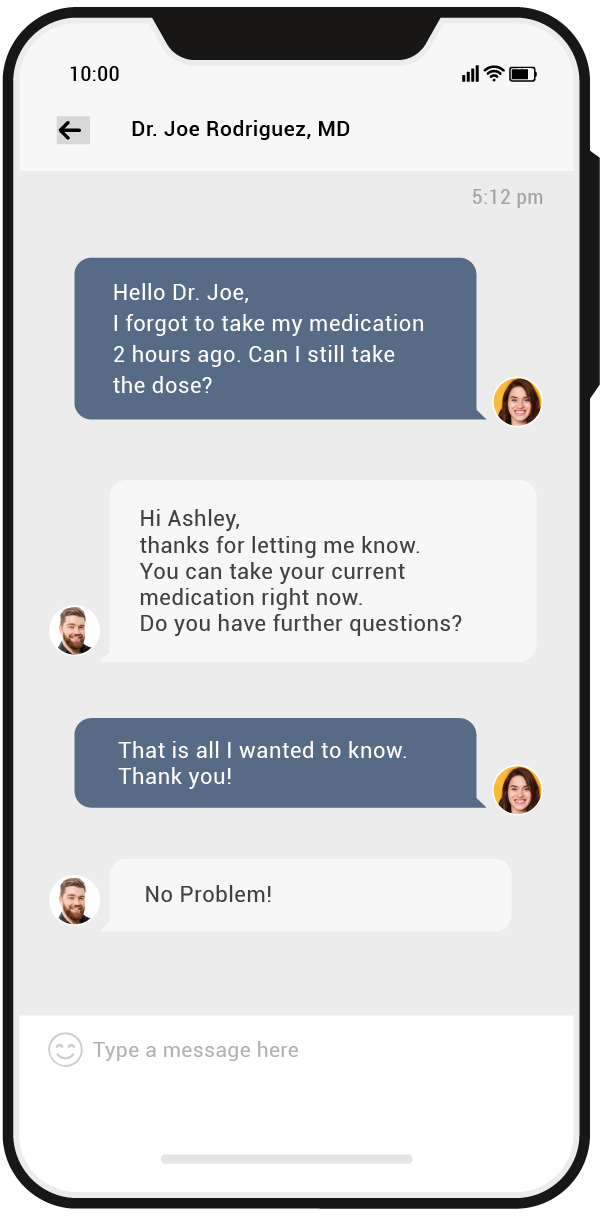Treatment for GAD often involves a comprehensive strategy tailored to the individual's specific needs and preferences, the severity of symptoms, and the presence of any co-occurring health conditions. According to the U.S. National Institute of Mental Health, the common treatment modalities for GAD include:
Psychotherapy
Psychiatry providers often use cognitive behavioral therapy (CBT) to treat GAD. This research-supported type of psychotherapy helps patients identify and modify negative thought patterns, develop coping strategies, and manage excessive worry. CBT is the gold standard for psychotherapy.
Acceptance and commitment therapy (ACT) is a newer form of psychotherapy treatment. It focuses on increasing psychological flexibility—the ability to be open, adaptable, and effectively engage in behaviors that align with one's values in the presence of challenging thoughts and emotions.
Our team of experienced anxiety specialists believes in the importance of continuous and consistent psychiatric care. This is why we offer ongoing psychotherapy services where individuals struggling with GAD can receive personalized support and guidance in managing their symptoms—in the comfort of their own homes. To learn more about our telepsychiatry services, schedule an online appointment with one of our mental health providers today!
Medication Management
Medications can often play a crucial role in treating GAD by addressing underlying neurochemical imbalances associated with excessive worry and anxiety. They can help relieve GAD symptoms, improve functioning, prevent panic attacks, improve sleep quality, and make it easier for patients to engage in psychotherapy sessions.
The common medications used in GAD treatment and management include:
- Selective Serotonin Reuptake Inhibitors (SSRIs). SSRIs are antidepressants that doctors can prescribe to individuals with GAD as first-line treatment.
- Serotonin-Norepinephrine Reuptake Inhibitors (SNRIs). SNRIs are antidepressants that also work for anxiety disorders and chronic pains. They increase the levels of norepinephrine and serotonin in the brain and regulate breathing, blood flow, and heart rate.
- Benzodiazepines. Benzodiazepines reinforce the brain chemical GABA (gamma-aminobutyric acid) and block the neurotransmissions or brain signals. Providers may prescribe the short-term use of benzodiazepines for rapid relief of acute anxiety symptoms. However, they generally avoid long-term use due to the risk of dependence.
- Buspirone. Buspirone is an anti-anxiety medication that works differently from benzodiazepines and has a lower risk of dependence.
Choosing medication for GAD depends on factors such as the patient’s specific symptoms, medical history, preferences, and the drug’s potential side effects. Working closely with one’s mental health provider is essential to determining the most suitable medication and monitoring for any potential side effects or adjustments needed in the treatment plan. This is why our team takes a holistic and collaborative approach to medication management.
When we treat anxiety, we look at the whole picture. By following this methodology, our team doesn’t settle with merely alleviating symptoms—we delve into the root cause, pursue a holistic solution, and deliver long-term results.
Support Groups
Individuals grappling with anxiety disorders often find value in joining self-help or support groups where they can openly discuss their challenges and milestones with fellow members. Thanks to modern technology, these groups exist in person and online.
It's important, however, to approach advice received from support group members with caution, recognizing that it does not substitute professional treatment recommendations provided by an experienced psychiatry provider.
Healthy Habits
While it cannot replace a personalized and comprehensive treatment plan, adopting a healthy lifestyle is beneficial in mitigating anxiety. Research shows that incorporating specific health-conscious habits into your daily routine (e.g., reducing caffeine consumption and getting adequate sleep) can effectively reduce anxiety symptoms when combined with psychotherapy and medication.
Stress management practices like regular exercise, mindfulness, and meditation help alleviate anxiety symptoms and amplify the impact of psychotherapeutic interventions. To learn more about how a comprehensive and holistic approach can significantly improve your journey toward overcoming anxiety, schedule an online appointment with one of our psychiatric care providers!














